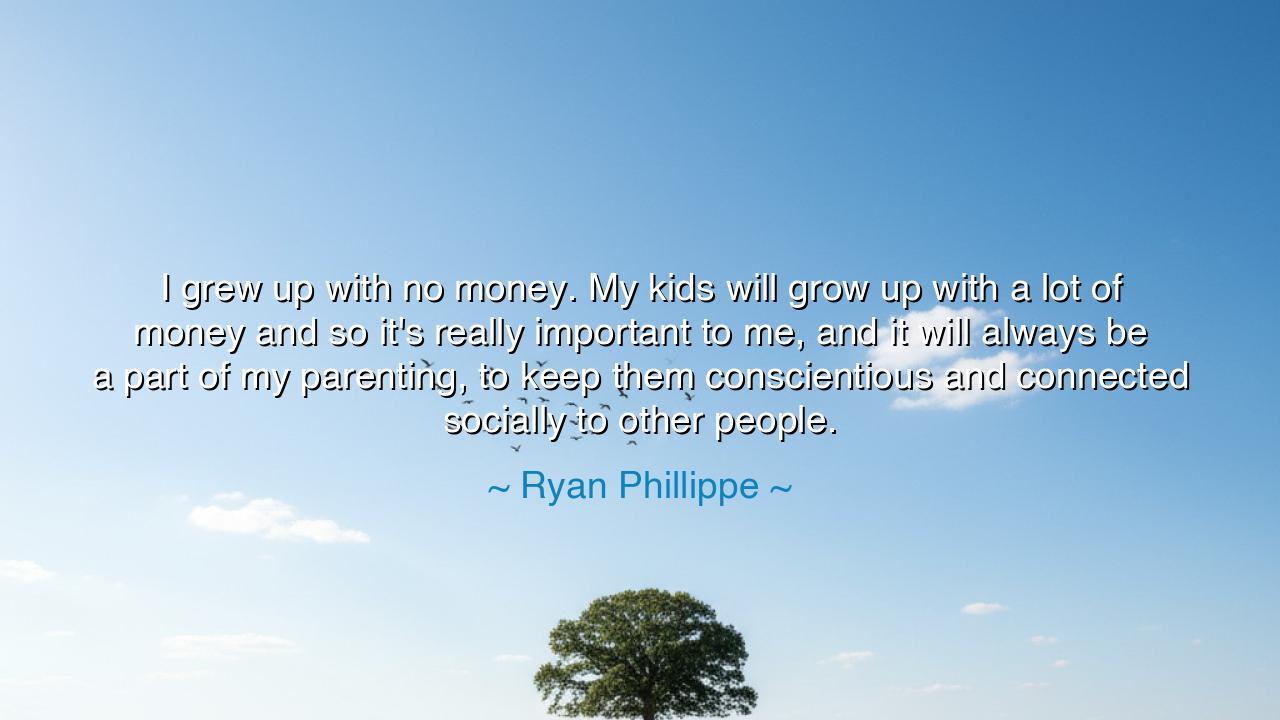
I grew up with no money. My kids will grow up with a lot of
I grew up with no money. My kids will grow up with a lot of money and so it's really important to me, and it will always be a part of my parenting, to keep them conscientious and connected socially to other people.






In the words of Ryan Phillippe, we hear both gratitude and caution: “I grew up with no money. My kids will grow up with a lot of money and so it’s really important to me, and it will always be a part of my parenting, to keep them conscientious and connected socially to other people.” This confession speaks to the great shift between generations: from scarcity to abundance, from struggle to comfort. Yet it also acknowledges a danger older than time—that wealth, when untempered, can isolate, corrupt, and blind the heart to the struggles of others. Phillippe’s words are thus a vow, a recognition that to raise children rightly in abundance requires more vigilance than raising them in want.
The ancients often warned of this very truth. In the Proverbs, it is said: “Give me neither poverty nor riches, but only my daily bread.” For poverty may bring desperation, but wealth may bring arrogance and blindness. Plato likewise observed that in wealthy cities, children often grew soft and entitled, forgetting the virtues that hardship had once forged in their ancestors. Phillippe’s reflection echoes these ancient warnings: his own struggle taught him humility and awareness, and now his sacred task as a father is to ensure that his children, though surrounded by comfort, do not lose the strength and compassion born of struggle.
History offers a striking mirror in the story of Marcus Aurelius. He was born into wealth and privilege, yet he became one of Rome’s greatest philosopher-kings. Why? Because he was taught from youth to practice self-discipline, to study philosophy, to see himself as a servant of the people rather than a master. His parenting of his adopted heirs was rooted in teaching humility and service. Contrast this with other emperors’ children who were given every luxury but no grounding; many grew decadent and cruel, causing ruin to their families and their empires. From this we learn: abundance without humility leads to decay, but abundance joined with conscience leads to greatness.
Phillippe also speaks to the importance of staying connected socially. For wealth can build walls as easily as it builds houses. A child raised only among privilege may never hear the cry of the poor or see the courage of those who struggle. But to be among others, to share meals, games, laughter, and sorrow with people from every walk of life—this is to remain human. The old prophets warned against “hardening the heart” toward the poor, for to forget them is to forget the image of humanity itself. Phillippe’s vow is thus not only personal but universal: to keep his children human by keeping them connected.
The meaning of his words is deeply emotional, for they arise from memory. Having once been poor, he knows the virtues hardship carved into him—resilience, gratitude, compassion. And he fears that his children, lacking those trials, might drift into entitlement or detachment. It is the paradox of love: to wish your children an easier life than you had, yet to know that too much ease may rob them of strength. Every parent who rises from poverty to wealth faces this same dilemma. Phillippe’s honesty reminds us that the true inheritance we must give our children is not wealth alone, but wisdom, humility, and responsibility.
The lesson for us is clear. First, let us teach our children gratitude, reminding them daily that abundance is not earned by all and must be honored, not squandered. Second, let us keep them socially grounded, encouraging friendships, service, and compassion across all walks of life. Third, let us model humility ourselves, for children learn not by sermons, but by seeing how their parents live. A father who shares, a mother who serves—these teach more than words ever could.
O seekers of wisdom, remember this: money may build comfort, but only conscience builds character. To raise children well is not to shield them from every struggle, but to prepare them to meet the world with open eyes and open hearts. Wealth can be a blessing or a curse, depending on whether it is joined with humility or arrogance. Therefore, let your abundance never blind you; let it instead deepen your responsibility to others.
Thus, Ryan Phillippe’s words endure as a reminder across generations. He speaks not only as a father, but as a witness of life’s two extremes: the struggle of poverty and the temptations of wealth. His vow is one we should all share—to raise children who remain conscientious, grounded, and compassionate, no matter their circumstances. For in shaping such children, we shape a world where abundance is not wasted on self, but used in service of all.






AAdministratorAdministrator
Welcome, honored guests. Please leave a comment, we will respond soon